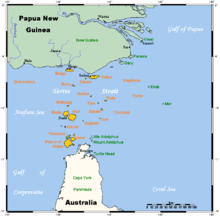Kala Lagaw Ya language
| Kalaw Lagaw Ya | |
|---|---|
| Western Torres Strait | |
| Mabuiag | |
| Region | Western and Central Torres Strait Islands, Queensland |
| Ethnicity | Torres Strait Islanders |
|
Native speakers
|
700 (2005) to 1,200 (2006 census) |
|
Pama–Nyungan
|
|
| Dialects |
|
| Western Torres Strait Islander Sign Language | |
| Language codes | |
| ISO 639-3 | |
| Glottolog | kala1377 |
| AIATSIS | Y1 |

Range of Kalaw Lagaw Ya (orange) in the Torres Strait
|
|
Kalaw Lagaw Ya (Kala Lagaw Ya), or the Western Torres Strait language (also several other names, see below), is the language indigenous to the central and western Torres Strait Islands, Queensland, Australia. On some islands it has now largely been replaced by Torres Strait Creole.
Before colonisation in the 1870s–1880s, it was the major lingua franca of the area in both Australia and Papua, and is still widely spoken by neighbouring Papuans and by some Aboriginal people. How many second (or nth) language speakers it has is unknown. It also has a "light" (simplified/foreigner) form, as well as a pidginised form. The simplified form is fairly prevalent on Badu and neighbouring Moa, particularly among younger people.
The language is known by several names besides Kalaw Lagaw Ya, most of which (including Kalaw Lagaw Ya), are names of dialects, spelling variants, dialect variants, and the like - and include translations of the English terms, Western Island Language and Central Island Language. The following list includes the commonest:
One term used by Eastern islanders and neighbouring Papuans for Kala Lagaw Ya is Yagar Yagar, from the word yagar (yá 'speech, etc.' + gár 'sympathy clitic' ('dear', 'please', etc.), often used by Western and Central Islanders in speech to show a sympathetic or nostalgic frame of mind.
In literature on the language the abbreviations KLY (Kalaw Lagaw Ya), KKY (Kalau Kawau Ya), KulY (Kulkalgau Ya), MY (Muwalgau Ya) and KY (Kaiwaligau Ya) are often used as abbreviations. According to Ober (2007), the preferred term in English is Kala Lagaw Ya. The name "Mabuiag", pronounced "moby-agg", a European mispronunciation of Mabuiag /mabujag/, is fairly widespread as a name for the language, this having been established by the Cambridge Expedition to Torres Strait, whose main research on the language was with Mabuiag material. In a High Court decision on 7 August 2013, the decision was taken to officially term the language Kalau Lagau Ya.
When speaking to each other, speakers generally refer to the language as Langgus "Language" or use phrases such as KLY/KulY ngalpudh muli, MY-KY ngalpudh/ngalpadh muli, KKY ngalpadh muliz, e.g. KLY/KulY ngalpudh muuli, thanamunungu tidailai!, MY-KY ngalpudh/ngalpadh muuli, thanamuningu tidailai!, KKY ngalpadh muli, thanamulngu tidaile! 'Speak in our language so they don't understand!'. Ngalpudh/ngalpadh literally means 'like us'. The construction X-dh mula+i- 'speak X-like' is used to refer to speaking in a language, e.g. KKY markaidh muliz 'speak [in] English', zapanisadh muliz 'speak [in] Japanese', dhaudhalgadh muliz 'speak [in] Papuan', mœyamadh muliz 'speak [in] Meriam Mìr', thanamudh muliz 'speak like them, speak [in] their language'. It is otherwise common for speakers to use nominal phrases like KLY/KulY ngalpun ya, MY-KY ngalpun/ngalpan ya, KKY ngalpan ya 'our language' to refer to the language when speaking to each other.
...
Wikipedia
